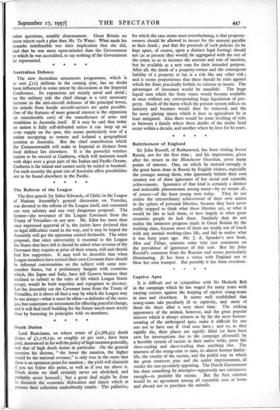Captive Apes It is difficult not to sympathise with Sir
Hesketh Bell in the campaign which he has waged for many years with varying success against the keeping of captive orang-utans in zoos and elsewhere. It seems well established that orang-utans take peculiarly ill to captivity, and most of them die there after a very short time. The striking appearance of the animal, however, and the great popular interest which it always attracts as by far the most human- seeming of the anthropoid apes, make it difficult for one zoo not to have one if rival zoos have ; and so, as they rapidly die, their places are rapidly filled (or have been save for interruptions due to the campaign aforesaid) by a horrible system of razzias in their native wilds, more like slave-raiding and slave-trading than anything else. The nearness of the orang-utan to man, its almost human family- life, the cruelty of the razzias, and the pitiful way in which the great creatures pine and die under imprisonment, all render the case peculiarly appealing. The Dutch Government has done something by attempts—apparently not continuous enough—to prohibit the razzias. But the best solution would be an agreement among all reputable zoos at home and abroad not to purchase the animals.










































 Previous page
Previous page